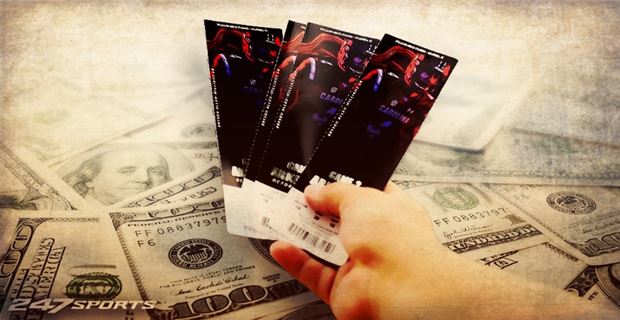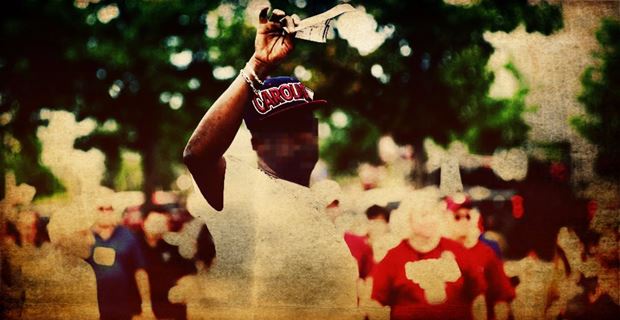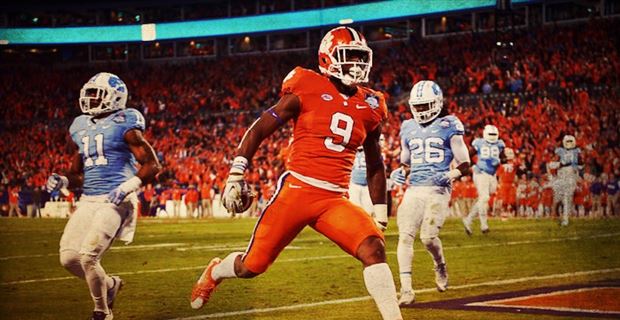Is It Easy to Scalp and Extra Ticke

Perched between two trees on a muggy evening in North Carolina, James pulls two tickets from a perforated stack before finishing a hand-to-hand exchange with a man holding a crumpled seating chart and large bills.
That looked too easy.
James is still learning the ropes around NC State's Carter-Finley Stadium as a newcomer within a ticket-scalping ring working a Thursday night showdown featuring reigning Heisman Trophy winner Lamar Jackson.
"I just buy extras I can find under face (value), and sell these for as much as I can," said James, who spoke to 247Sports on the condition his last name would not be used in this story. "My partner told me it's good money and this game was the hot ticket."
It's Oct. 5. The Wolfpack is 2-0 in the ACC for the first time in more than a decade before arguably the biggest home game in Dave Doeren's tenure and there's a noticeable buzz in and around tailgate park near the stadium.
And it's time for James and his crew to get to work.
Scalpers aren't hard to find. They creep around corners. Some huddle near high-traffic areas. The novice cyclists — many use bicycles to cover more ground — narrowly miss fans steering with one hand and clutching tickets in the other.
And they love college football season, a three-month opportunity at honing in on a sometimes-booming industry with expert-level salesman tactics. Most of them know your team's key players. They've studied the stakes. And they can sense your extent of desperation as kickoff draws near.
Your cash and excess is how they thrive and without it, gameday's wasted.
It's a fascinating dichotomy — potential buyer vs. ticket scalper. Sometimes, these sellers have handfuls of corporate extras, have stockpiled pre-purchased tickets or pooled extras from fans to make a buck, knowing what they consider the market price to maximize profit.
Differentiating between authentic and fake tickets is a challenge and the only way to know is by a successful digital fingerprint upon entry. High-end printers make scamming easier and tickets reported stolen are deactivated and re-issued, which means the original ticket — one you may have purchased — is void.
You're out of luck if you're left at the gate with a counterfeit or already-used ticket. There's no refunds or buybacks in this game, so of course, there's a hint of seediness involved.
One scalper approached by 247Sports frantically grabbed his phone and told an associate — who it's safe to assume is one of the kingpins of the operation stationed along Trinity Road in Raleigh — that "there's a reporter walking around trying to knock our hustle."
The rest of the conversation was quick as the scalper put his phone in his pocket and briskly walked to another area, just in front of a large sign that reads "Ticket Resale Zone" before meeting another ticket-seeker.
Flipping tickets to sporting events has been going for decades, but it's still a hush-hush underground industry that makes those involved sweat a bit.
"It's people like you who mess up a good thing," a scalper, who wouldn't provide his name, told 247Sports. "We're just trying to make money."
There's a $3 above face value limit on ticket sales in North Carolina person-to-person, but online restrictions are lax. Ticket brokers within the state who sell online can dump tickets without a cap price unless a venue prohibits resale by filing a notice with the Secretary of State.
Not all scalpers delve in illegal activity, but some that do make glaring mistakes that alert authorities.
In March, a Carrboro man was arrested for selling fake tickets to a Duke-North Carolina men's basketball game on Craigslist when local law enforcement spotted the ad. The game, a Saturday night sellout, was one of the toughest tickets of the season for fans of either team and this seller had more than 30 tickets available.
The suspect even had fake receipts from the University of North Carolina's ticket office.
"If you aren't certain the tickets are real, take a pass," the North Carolina Department of Justice said in a statement after the arrest. "The view from your couch is pretty good, and your wallet will thank you for it."
Christmas Day for scalpers: Georgia-Notre Dame
In September, Georgia ticket broker Jeff Cook was arrested by local law enforcement and charged with selling sports tickets without a license and advertising sports tickets for sale without posting a license number.
In short, Cook "oversold" an allotment of Georgia-Notre Dame tickets in South Bend after the Putnam County Sheriff's Office in Eatonton, Ga., received dozens of complaints from angry customers.
Reportedly, hundreds of Bulldogs fans showed up at Notre Dame Stadium without tickets and Cook was nowhere to be found to make good on his ticket delivery.
Scalpers and ticket brokers aren't scholars with doctorates in finance. They're ordinary people with a buy low, sell high mentality.
"The basic principle to (scalping) is what price is going to equate to supply and demand," Richard Sheehan, a Notre Dame finance professor, told 247Sports. "For some games, that price to going to be much higher than an institution is willing to charge for the tickets. If they charge that high, they're going to catch flack.
"For Notre Dame-Georgia, resale value was over 1,000 dollars. If Notre Dame was to charge that, they would just be absolutely, and probably justifiably, ripped in the media."
One of the ways universities have tried becoming more competitive against the resell market over the last decade is the introduction of ticket packages, multi-game options that often feature a team's marquee matchup. For the most part, the only way to get first dibs on a game like Alabama-LSU at face value is to buy tickets to the Crimson Tide's home game vs. Mercer as well.
But when tickets are sold for less than the highest price the market stands for instance, it helps venues with sellouts, thus leaving the consumer and university happy.
Most college football fans are under the assumption that ticket scalping is illegal, but it actually varies state to state and in most areas, is rarely regulated and is a lot less taboo than it used to be.
In Indiana, there are no restrictions for secondary ticket sales unless the event is a boxing or unarmed sparring match (Indiana Code 25-9-1-26) — ideal for Notre Dame fans or scalpers looking to resell tickets.
"Selling tickets on campus used to be not only allowed, but widely condoned maybe 20 years or so ago," said Sheehan, whose published three books on the economics of big-time college sports. "Before a game like Notre Dame-Florida State, you'd have all kinds of people holding up fingers. 1 ticket. 2 tickets. 3 tickets. Now, there's none of that occurring on campus."
A few feet off campus grounds is the breeding ground for reselling on gamedays, Sheehan says. One of the more popular spots to scalp tickets is near off-ramps leading into any of Notre Dame Stadium's arteries — blocks from the venue, but clogged with cars and people.
"There used to be a bunch of people who would be more or less camped out there," Sheehan said. "Now, that's very much expanded to at least a dozen other street corners."
Georgia-Notre Dame was a reseller's paradise, two unbeaten storied programs squaring off in prime-time. And Bulldogs fans came out in full force with nearly a quarter of the sellout crowd donning red and black inside Notre Dame Stadium at kickoff.
Many Irish season ticket holders were chastised in the aftermath for giving up their own tickets to visiting fans.
But who could blame them, Sheehan says.
"Georgia got almost 9,000 ticket allocated to them, but another 9,000 fans Georgia fans bought tickets one way or another from other sources," Sheehan said. "From an individual season ticket holder perspective, if you can make up the price of season tickets in one game, that may not be a bad deal since you get to go to five other games for free.
"The university doesn't want to sell 80,000 tickets at $500 a pop. That would not be good PR."

Hype drives price in the SEC
It's two hours before kickoff and fans are starting to scramble outside of Williams-Brice Stadium in Columbia, South Carolina.
The Gamecocks are unbeaten with a chance to reach the Top 25 for the first time in three seasons with a win over Kentucky in the home opener. Fans are starving to see this team play.
Night game. Blackout. Sold out.
One scalper, who asked to remain anonymous, sees dollar signs.
"$300 for the pair," he said, checking with an interested fan.
This was for South Carolina-Kentucky. Imagine the asking price weeks from now if the Gamecocks are still considered a threat in November.
The fan immediately accepted the offer and pulled three bills from her purse. Supply and demand.
Capitalism at its elementary level.
The stadium's entry points haven't opened yet and Gamecock fans are paying considerably higher than face value for lower level seats. Another man is donning a hand-made "I NEED TICKETS" sign around his neck, pieced together with string and two sheets of corrugated plastic.
It looks like he has formed letters with black electrical tape. He's done this before, but Game 1's ensemble looks thrown together.
"This is my seventh year buying and selling," Russell told 247Sports, pulling a wad of tickets from his jean pocket. "I come out here every game."
But Russell isn't actually going to the game. He's wearing a Gamecocks hat, but who knows if he supports the team. He's looking to buy extras or sell what he has left. It's a profitable scheme for a couple hours of work.
Russell's focus shifts to a man idling at a red light who just rolled down his window. He's moving in.
"You need tickets?" Russell asks the fan. "I've got lowers."
"How low?" the fan said, pulling down his sunglasses for a closer look.
"Section 3, right next to (Will) Muschamp," Russell said. "$200 each."
"I'm good, bud," the fan responded, motioning to someone in the backseat before driving off.
"Aight, you ain't going to get them any cheaper," Russell said.
In the Palmetto State, selling a ticket to a sporting event more than $1 over face value is illegal according to South Carolina Code 16-17-710. In this instance, four police officers were within 100 feet of a scalper and none so much as batted an eye during what could've been a transaction.
Laws varies by state and are rarely enforced as resellers move tickets for large sums in street deals.
"We have different rules for city and county ordinances, but it gets so crazy down here (on gamedays) we don't usually interfere unless someone calls about an individual," one Columbia police officer told 247Sports.
There's a reason Russell and other scalpers aren't loitering near the stadium's underbelly and instead stroll back and forth along the sidewalk across the street.
"They can sell for whatever they want over there as long as they're not on this side," another officer said, pointing toward South Carolina's tailgating metropolis known as Gamecock Park.
In Tuscaloosa, Alabama, a city ordinance prohibits scalpers from reselling tickets unless they've paid for a special permit, a $100 business license with a photo ID. City code was amended in 2014 to reflect the Tuscaloosa City Council's vote, a means of policing ticket reselling while the city also gets its cut in the local economy.
You can find state-to-state ticket resale laws, here.
Safety measures in place to protect buyers
Private ticket companies like Jeff Cook's All Sports Tickets are minute holdings in the online ticket marketplace, a spectrum dominated by the likes of StubHub, TicketCity and VividSeats.
The safest route to buying tickets to a college football game has always been directly through the university and now, several companies have exclusive partnerships with schools to make transactions much easier.
Alison Salcedo, StubHub's head of consumer public relations, says the industry leader in the secondary market is the first to offer a Fan Protect Guarantee, 100 percent money-back transactions for the buyer and the seller if something goes awry. StubHub has partnerships with more than 40 Division I schools including Alabama, Georgia and Auburn, which results in seamless transfers of tickets for customers using the site to sell or purchase seats.
"Every ticket is an investment and for some people, maybe it's a bucket list moment," Salcedo said. "We view every transaction and every customer in that way. We treat every transaction like it's a customer's first game or event."
StubHub employs a robust global safety and security team that's available around the clock with tech support in case there's authenticity questions that arise on gamedays.
Most street scalpers sell paper tickets and very few are willing to walk to the venue entrance after a transaction to ensure your ticket scans.

John Azzarelli, a Clemson football fan who has purchased tickets from scalpers "over 100 times" in the past, was scammed out of $300 the morning of the 2015 ACC Championship Game before his Tigers played North Carolina. He bought two tickets 13 rows from the field on the 50-yard line from a Craigslist seller during a meet-up in downtown Charlotte and thought nothing of it.
"The tickets had the Ticketmaster stamp, the advertisements on the back, everything," Azzarelli said. "I actually joked with some other scalpers later in the day and one guy offered me $500 for the pair. I laughed and said I can't since I promised my wife these tickets. "I wish I would've taken their offer."
After going through bag search at Bank of America Stadium, Azzarelli's scalped tickets wouldn't scan.
"I was so mad we just got in our car and drove to the hotel and watched the game in the room," he said. "The guy used a trash phone I guess because he wouldn't answer it or respond to texts."
Azzarelli didn't bother alerting local authorities. The ticket seller had vanished.
"I will not buy from a scalper ever again unless they look like a family trying to get rid of extra tickets or something," he said.
The Southeastern Conference, in recent years, has warned fans about counterfeit tickets to its league championship game in Atlanta. No ticket is foolproof and if you're buying on gameday from a scalper, it's high risk. Buying through a secondary online vendor, like StubHub, eliminates that scare.
"We recommend buying tickets to games from a reputable source so that you can protect your investment," Salcedo said.
Not to mention tickets to games that aren't sellouts are often available for less than face value online.
One hour prior to the start of the Florida-South Carolina game on Nov. 11, you could buy a lower-level ticket off various secondary market sites from your smartphone for $33 plus convenience fees — considerably less than the university's asking price.
The cheapest 247Sports could find a lower-level seat from a scalper was face value of $60.
Since instituting a "Ticket Validation Window" in 2008, counterfeit ticket sales have decreased, according to Chuck Dunlap, the SEC's communications director. There are still some that slip through the cracks, but updated security measures — like the addition of holographic foil and raised font on paper title game tickets — have helped keep the counterfeit market at bay.
"As our fans become more technology savvy, we would like to use implement items such as mobile tickets," Dunlap said, in an email to 247Sports. "For example, the (Atlanta) Falcons are using RFID season ticket cards and mobile tickets this season at the new stadium."
RFIDs — Radio Frequency Identification tickets — were first implemented in 2015 at Disney Parks through MagicBands, which feature a tiny embedded chip detectable at short-range touch points throughout Walt Disney World Resort.
With the secondary ticket market raking in billions annually according to most estimations, the market is growing and universities, along with professional sports franchises, are struggling to keep up.
Atlanta-based lawyer Eric Schroeder says there is one avenue that could be used to curtail scalpers.
"The most obvious way for a team to discourage secondary market sales is to allow only a ticket's original purchaser (or a permitted transferee) admission to the game or event for which the ticket was issued," Schroeder wrote in a law review published in 2012. "One way to implement this approach is to require the purchaser of tickets to present photo identification upon redeeming the tickets at the venue. Not giving ticket purchasers a required element to engage in a sale on the secondary market (the ticket itself) until present at the venue would discourage secondary market sales."
Wait it out for best price
With tickets in hand, James has now moved to the other side of NC State's Carter-Finley Stadium, facing the parking lot of PNC Arena, home to the NHL's Carolina Hurricanes.
Tailgaters are everywhere and many fans are making their way toward the venue's primary entrance — ample foot traffic means potential suitors for a game starting in 35 minutes.
James picks a couple donning Wolfpack jerseys out of a crowd before another scalper oversees the meeting.
"Make me an offer," James tells the man, standing next to his date. "These are great seats."
No one in this reselling syndicate, especially James, wants to go home with unused tickets.
Editor's note: For this story, 247Sports reached out to 13 ticket sellers outside three FBS games this season and more than half refused participation. Two agreed to go on the record with first names only and three others provided background information, anonymously.
Reach 247Sports national analyst Brad Crawford at brad.crawford@cbsinteractive.com or on Twitter at BCrawford247.
Source: https://247sports.com/Article/College-footballs-real-hustlers-The-ticket-scalping-syndicate-110877044/
0 Response to "Is It Easy to Scalp and Extra Ticke"
Postar um comentário